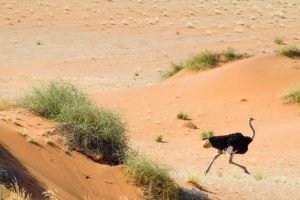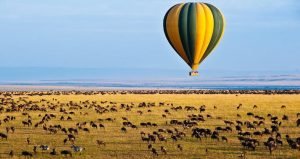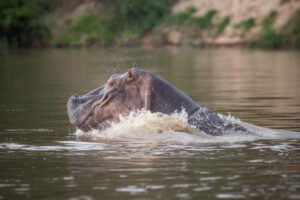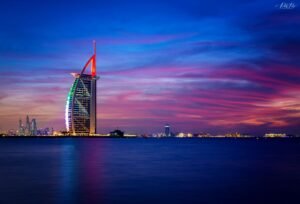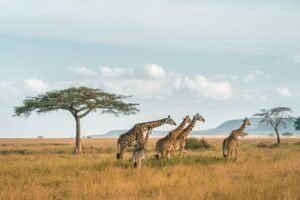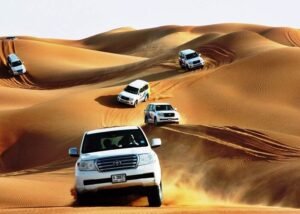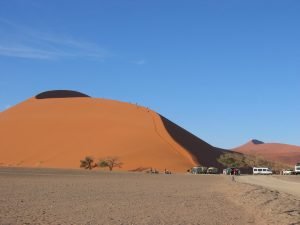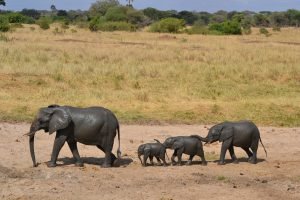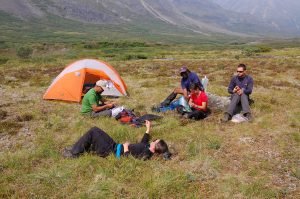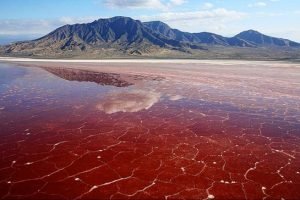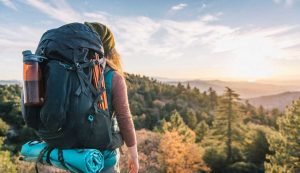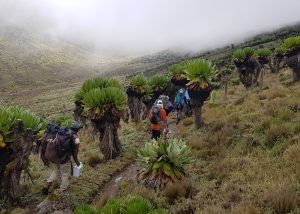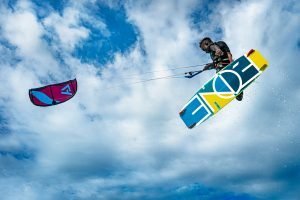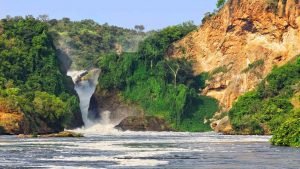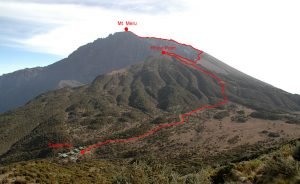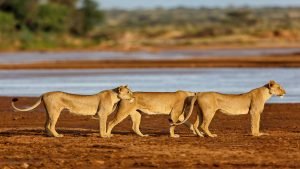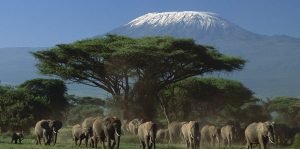Arrive at Naromoru by 1000hrs where you start sorting personal equipment for the mountain trek. Then be driven to the Sirimon Park Gate where you sign and start a 3hrs hike through the equatorial forest to the camp for overnight (3,300m) Packed lunch is served on route. An easy trek in the afternoon to help acclimatization. Overnight Judmaier Camp (3300m) in the high altitude mountain tents.
Camp; Judmaier camp 3,080m/ 10,000ft.
Accommodation facility; High altitude tents- camping.
Trekking time; 3 hours.
Distance; 9 km.
Rating; Medium.
Altitude gained; 400m.
After breakfast trek up the moorland and break away from Sirimon track to the plains of Sirimon valley where you encounter wildlife grazing on the moorland- zebras, water bucks, Thomson’s gazelle…, proceed contouring into the Sirimon Valley to the campsite. This is a seldom visited area with a tremendous amount of wildlife. Overnight in Sirimon Valley, altitude 3,940m.
Camp; Sirimon valley camp 3,940m/ 13,000ft.
Accommodation facility; High altitude tents- camping.
Trekking time; 5 – 6 hours.
Distance; 8 km.
Rating; Medium.
Altitude gained; 800m.
An early start out of the Sirimon Valley and into the head of the Hinde Valley. We then cross the Nithi and Gorges Valleys. This is undoubtedly one of the most scenic areas of the mountain with its longest vertical cliffs, its virgin valleys and cascading water-fall, is one of the most spectacular trekked areas in Kenya. Night camped at Hall Tarns(4,300m).
Camp; Hall Tarns camp 4,300m/ 14,200ft.
Accommodation facility; High altitude tents- camping.
Trekking time; 5 -6 hours.
Distance; 9 km.
Rating; Medium.
Altitude gained; 400m.
hours.
Distance; 9 km.
Rating; Medium.
Descend to Lake Michaelson, in the depth of the Gorges Valley. See the incredible cave formation known as the Temple. Walk down the valley to Vivienne falls (named after the famous author of Speak to the Earth). Return to camp in the afternoon. Overnight at Hall Tarns (4,300m.).
Camp; Hall Tarns 4,300m/ 14,200ft.
Accommodation facility; High altitude tents- camping.
Trekking time; 6 hours
Distance; 7 km.
Rating; Medium.
Altitude gain; descend 200m then back to camp.
.
Camp; Naromoru – 1,970m/ 6,500ft.
Trekking time; 3
Pre-dawn start at 0300hrs from the Mintos camp and attempt the 3rd highest peak – Pt. Lenana, 4,985m to be on the top of the summit by sunrise for good view of the main peaks and mountain environs. On a clear day you can be able to see Uhuru peak of Mt. Kilimanjaro- a few minutes for celebration and photos. Then descend down on the Westside of the mountain through the Austrian hut, proceed down to Mackinder hut for breakfast and rest. Afternoon hike for 05 hours through the moorland to Met.Station camp for dinner and overnight.
Longest day.
Peak Summited; Point Lenana, 4985m/ 16355ft
Camp; Met. Station- 3,080m/ 10,000ft.
Accommodation facility; High altitude tents- camping.
Trekking time; 14 hours (With breaks).
Distance; 18 km.
Rating; High.
Altitude gained; 785m.
After breakfast begin a 3 hours nice walk through the forest to Naromoru parkgate where you find vehicle waiting to transfer back to Nairobi or your next destination
Number OF People | Price in USD per person |
1 Person | $2150 |
2 Pax | $1850 |
3 Pax | $1750 |
4 Pax | $1675 |
5 Pax | $1625 |
6 Pax | $1600 |
7 Pax | $1575 |
8 Pax | $1525 |
Cost includes;
• Pickup from Nairobi to the start of the mountain –depending with the itinerary.
• *All park entry fees,
• *Camping fees,
• Full board up on the mountain,
• Guide, Cook, and porters,
• Accommodation in high altitude tents in Single or Twin Sharing (As per the itinerary),
• Accommodation in mountain huts – depending with the itinerary.
• Drop off at Nairobi after the trek.
Not included;
• All personal trekking gears – see list attached. We do have gears for hire from our mountain store.
• Accommodation in hotel before and after the trek.
• Drinks, shopping, tipping and extras while on safari.
ENJOY
www.simasafari.com Mountain Equipment List & Hiring charges.
Items on this list has been chosen to maximize your comfort and safety while hiking on the mountain.
FOR THE HEAD AND FACE:
• Wool hat: Bring one that covers ears, a balaclava type is excellent.- available for hire @ Usd 20 per hat.
• Shade Hat: Visor hats with good brims are essential for protection from the equatorial sun.
• Sunglasses: Essential for eye protection in the tropics, at altitude. • Sunscreen: Bring plenty of complete sun block.
• Lip Balm: you’re favorite.
FOR THE UPPER BODY:
• Upper Body Layers: For climbing the mountain we recommend you have three warm layers. Items must be made of wool, synthetic or pile. Make sure all layers fit comfortably over each other and supply good insulation. – Down Jacket or heavy jacket of wool- available for hire @ Usd 40 per jacket.
• Freeze jacket or warm wool sweater- available for hire @ Usd 30 per sweater.
• T-shirts – 3 pcs- Synthetic is the best.
•Gloves : Wool or pile. One pair of heavy mittens and a light pair of gloves work wellavailable for hire @ Usd 20 per pair.
• Rain Parka: Afternoon showers are common in East Africa, especially on the mountain. Bring a good rain parka- waterproof nylon that has been “seam sealed” – Available for hire @ Usd 40 per rain jacket.
LOWER BODY
• Quick Dry Hiking Shorts: 1 pair. Good for hiking at lower elevations on the mountain.
• Long Underwear Bottoms: One pair. Wool or synthetic.
• Wool, Bunting or Pile Pants: One pair that fit loosely and are comfortable.
• Rain Trouser: Bring a good pair of rain pants. Waterproof nylon that has been “seam sealed”. Available for hire at Usd 40 per pair
• Tights: Lycra or polypropylene type are comfortable to hike in, provide good warmth.
• Undergarments: Enough for the duration of the trek.
FOR THE FEET:
• Thin Socks: Two pair of synthetic socks to wear under heavy wool socks. These help to prevent blisters and keep feet dry- available for hire @ Usd 20 per pair.
• Thick Socks: 3 pairs of heavy wool or synthetic socks to wear for warmth with hiking boots- available for hire @ Usd 20 per pair.
• Hiking Boots: One pair medium weight hiking boots large enough to be comfortable with on liner sock and one heavy wool –available for hire @ Usd 40 per pair.
• Tennis Shoes or sandals: These are to wear in camp after a day of hiking.
FOR SLEEPING:
• Sleeping Bag: On the mountain temperatures can get down to zero degrees Fahrenheit at night so bring a warm bag- available for hire @ Usd 40 per sleeping bag.
FOR DRINKING:
• Water Bottle: One of 2 liters wide-mouthed plastic bottles at least. The rest of days we refill with stream water. Bring purifying tables.
FOR CARRYING YOUR GEAR:
• Rucksack (60ltrs): A comfortable pack with some support is adequate to carry personal gear by the porters- available for hire @ Usd 40 per rucksack.
• Day Pack: Small day pack for your personal loads with camera gear, water for the day and rain jacket and personal effects- available for hire @ Usd 30 per day pack.
• Store bag of the clothes to be left at hotel. This will meet you at the hotel after the climb.
• Plastic Bags: Several, to double bag your sleeping bag and clothes on the mountain. It can rain every afternoon.
FOR PERSONAL HEALTH AND COMFORT:
• Toiletries: Bring enough for entire trip. Keep simple and light. Bring enough for all your needs.
• Walking sticks: Optional* helps to balance on steep terrain- available for hire @Usd 25 per pair.
• Headlamp or head lamp: Important on summit day and handy in camp. Plenty of batteries- available for hire @ Usd 30 per headlamp.
• Personal First Aid and Drug Kit:
• Trail Munchies: Although plenty of snack food is provided, trekkers like that taste of home in their pack. Touted as an important accessory by those who have brought them in the past!
• Hot Drink Mixes: We will provide plenty of coffee, cocoa and tea, but non-caffeinated drinks are not readily available here. Bring a supply of your favorite herbal teas.
• Towel: For wash up in camp, a small one is fine, or you can use a bandana.
•Towelettes: Such as “Wash ‘n’ Dries” for general hygiene.
• Spare Glasses: For contact wearers in dusty conditions and any eye glass wearer while on vacation.
• Umbrella: Very useful against rain and sun. Most guides use one

